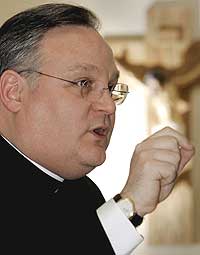By Kathryn Marchocki
The Union Leader [New Hampshire]
March 31, 2006
http://www.unionleader.com/article.aspx?headline=Church+sex+abuse+audit+points
+to+lack+of+background+checks&articleId=3793c8ce-959d-4976-83dc-7224c1231a23
Concord – The Roman Catholic Diocese of Manchester still has not fully implemented child protection policies it promised to enact under the agreement it struck with the state in 2002 to avoid criminal prosecution for child endangerment, an independent auditor's report released yesterday revealed.
Auditors found instances where church personnel who work directly with children had not received required training in child sexual abuse policies and had not even had their names checked against on-line sexual offender registries or undergone other criminal background checks.
"That's basic information that I would expect that parents would want to make sure gets done for anyone who works with children," state Attorney General Kelly A. Ayotte said at a news conference.
"Overall, this audit demonstrates that, while the diocese has taken some important steps by establishing policies and programs to protect children, there is still significant work that remains for the diocese to do. And, in some respects, the level of compliance is disappointing," Ayotte continued.
Three priests were removed from active ministry since the 2002 agreement, the audit showed. One case that involved a priest who used a parish computer to access pornography, and possibly child pornography, remains under investigation by the state, Ayotte said.
While authorities said no federal crime had been committed because the images were stored on a temporary file and had not been downloaded, the state is investigating whether this should have been reported under the terms of the agreement, she continued.
Auditors recommended the diocese use the priest's case to identify potential gaps in its compliance program stemming from its lack of timely enforcement of background screening requirements.
Submitting to annual audits by the Attorney General's office is one condition set down in the 2002 agreement the diocese reached with the state.
 |
|
The Rev. Edward Arsenault, diocese spokesman, said the church believes it has fully complied with the 2002 agreement, but that work remains to complete "administrative details." Photo by the AP |
The agreement followed an intensive criminal investigation by the state into the diocese's handling of child sexual abuse by priests from the 1930s through the 1980s. More than 100 alleged victims of child sexual abuse by priests were interviewed during the investigation, prosecutors said.
In striking the agreement, the diocese avoided criminal prosecution and admitted it failed to protect children from sexually abusive priests.
Ayotte said the auditors found inadequate record keeping, general ineffectiveness by the diocese in enforcing compliance and key personnel who had not been trained. There also were inconsistent levels of compliance across the diocese and no school, parish or camp visited by auditors was 100 percent compliant, she added.
While she commended the diocese for training about 9,000 church employees and volunteers on its child protection policies, she said the diocese cannot say how many have not received training because it doesn't know the total number of people it has working with children.
Ayotte blamed top diocesan leadership for these lapses.
"A fundamental problem appears to be a failure to take responsibility at the top of the diocese to provide guidance and assist local leaders," she explained.
Ayotte said her office is giving the diocese 30 days to present a plan for correcting the major deficiencies addressed in the audit.
The agreement allows either side to seek court action — such as possible contempt or injunctive or equitable relief — should there be a breach of its terms.
"If we have to, we will take court action if it comes to that. I hope it doesn't come to that," Ayotte said.
The Rev. Edward J. Arsenault, in a separate news conference, admitted more work needs to be done to reach full compliance with the agreement and the diocese's child protection policies.
He noted auditors did not indicate any minors were harmed since 2002 and no one credibly accused of abusing a minor is in ministry.
Arsenault said the diocese is committed to reaching full compliance and has hired a full-time compliance coordinator to assist in working toward that goal.
But Arsenault disputed some of the auditors' findings, saying their interviews were "so riddled with inaccuracies" that the diocese unsuccessfully attempted to correct them.
The "report has a lot of inaccuracies in it and, as a result of that, it's flawed," said Arsenault, who is the diocese's delegate for ministerial conduct.
Arsenault disputed the auditors' finding that his office and the bishop only are responsible for advising local parishes, and not enforcing compliance, with the agreement and the diocese's child protection policies.
"That is not true, nor has it ever been," he said. "I am the enforcer of the policy."
Auditors reported the diocese has no mechanism to verify the accuracy of information it receives from local parishes, schools and camps showing those working with children have been trained and had background checks done.
Arsenault disputed that finding, saying central administration staff members have visited these sites to verify information and address lack of full implementation.
While Ayotte said the audit is the first of four annual reviews that will be done, the diocese in a statement said it will submit to audits through Dec. 31, 2007.
Audits were stalled for several years while the church and state argued over their scope and cost. The court ruled last year that both sides would split the cost and said the state could measure the effectiveness of the church's policies, which the diocese argued against.
Auditors also found 8.5 percent of priests had not signed acknowledgments indicating they had been trained in child protection policies, a requirement which should have been done more than two years ago. Nearly 6 percent of priests did not have required screening forms in their files and nearly 5 percent did not have criminal records releases, auditors said.
Any original material on these pages is copyright © BishopAccountability.org 2004. Reproduce freely with attribution.